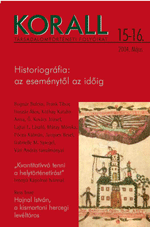A munka fogalma az egyiptomi Középbirodalom idején (Kr. e. 21–17. század)
The Concept of Work in Ancient Egypt during the Middle Kingdom
Author(s): Katalin Anna KóthaySubject(s): History
Published by: KORALL Társadalomtörténeti Egyesület
Keywords: social history; Ancient Egypt; Middle Kingdom; concept of work; religious beliefs
Summary/Abstract: According to prevailing central values of the Middle Kingdom, human work emerged in two basic forms that corresponded to two sorts of active relationship to the world; these were creating something new and transforming something existent. The dualistic view of work was manifest in a twofold terminology referring to activities performed by privileged groups on the one hand, and an inferior form of work on the other. Moreover, having been rooted in the ideology of kingship, it implicated a twofold conception of dependency relations between actors of the shared society of gods, the dead and humans, dividing the basic social units of the Egyptians, state and family respectively, into two qualitatively different groups. Privileged work was esteemed and rewarded, thus connecting superiors and subordinates by patronage and reciprocity, while the other type of work involved individuals submissive to their lords. This view of work coincides with a dualistic classification of society, so characteristic of the Middle Kingdom. However, a range of tools to evade work both on earth and in the afterlife hints at a rather intricate system, showing a variety of relationships between beneficiaries of work and its performers.
Journal: Korall - Társadalomtörténeti folyóirat
- Issue Year: 2004
- Issue No: 15-16
- Page Range: 70-88
- Page Count: 19
- Language: Hungarian

